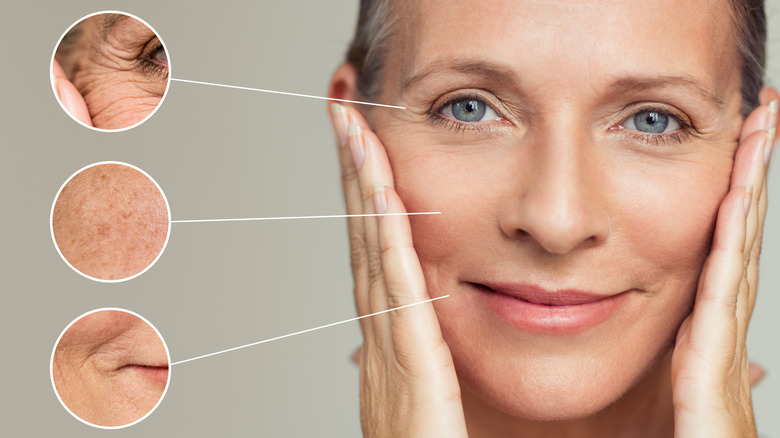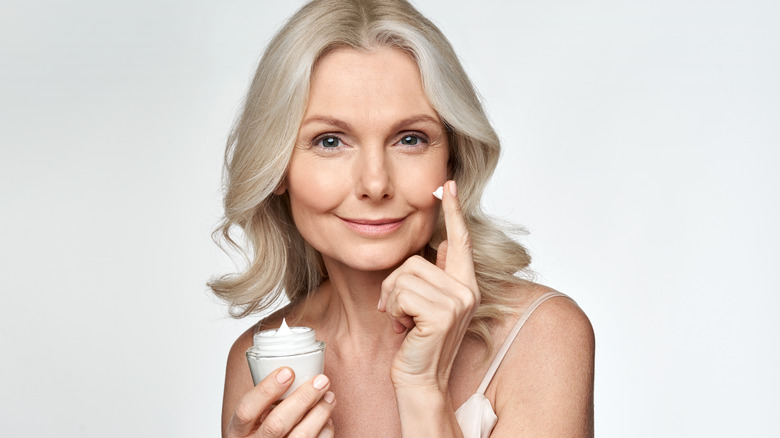The Skincare Ingredients You Need If You Have Wrinkles
We may receive a commission on purchases made from links.
Beauty has no age limits and we all face the aging process, including wrinkles. While you should embrace the skin that you're in, there are ingredients that can replenish the skin's naturally occurring protective compounds are lost through the aging process. There are several products on the market that make anti-aging claims, and it can be daunting to find the right ingredients to treat wrinkles. That's why we came up with a guide of several hero ingredients that have been proven to reverse the signs of aging and help you age like fine wine.
One of the most well-known anti-aging skincare actives is one you've probably heard of — retinol. Retinol, a derivative of vitamin A, helps repair the skin against wrinkles, acne, and hyperpigmentation, per Elle. Retinol works to boost skin cell-regeneration by speeding up the shedding of dead skin cells, per Self. Preventing the build-up of dead skin cells can remove dull, damaged skin and slow down the signs of aging. Some researchers say retinol can help increase collagen production, which is what keeps skin plump (via Self and Cedars-Sinai). There are a few mild side effects, initially, like irritation, flaky skin, and/or redness. To avoid these symptoms, it's recommended to try using retinol once every few days when starting out, and then increasing usage, up to once a day, as your skin becomes accustomed to it (via Elle). It's also recommended to limit application to nighttime. Retinol can make your skin photosensitive, or prone to sun damage.
Skincare ingredients that promote cell regeneration are key
If you want a supercharged version of retinol, Dr. John G. Zampella, an assistant professor in dermatology at NYU Langone Health, recommended asking your dermatologist about retinoic acid (via Self). Retinoic acid is available as a prescription as a topical cream/gel (tretinoin) or as an oral medication (isotretinoin). There are also over-the-counter topical medications with retinoic acid, like Differin products.
Alpha hydroxy acids (AHAs) are also commonly suggested to treat signs of aging, per Mayo Clinic. According to the Food and Drug Administration, AHAs help exfoliate dead skin cells that are on the surface of the skin by dissolving the bonds between the skin cells, per Self. Glycolic acid is one of the most commonly used AHAs in skincare, helping fight fine lines, wrinkles, and skin discoloration. AHAs can also cause mild irritation, and Paula's Choice advised to only apply AHAs once or twice a week. If you want a more gentle alternative, you can try another AHA called lactic acid, or polyhydroxy acids (PHAs) (via Self and Mayo Clinic).
According to Mayo Clinic, peptides are naturally occurring molecules in our bodies. Applying peptides to your skin can help promote collagen production, which will help plump the skin and diminish the appearance of wrinkles. Some other types of peptides generate wound healing by carrying important minerals necessary for the healing process (carrier peptides), or inhibit the production of enzymes that cause hyperpigmentation (enzyme-inhibitor peptides), per Prospector.
Protecting your skin from environmental factors is vital
Mayo Clinic also recommended using coenzyme Q10, which can help diminish fine lines and protect the skin against sun damage. According to a 199 study entitled "Coenzyme Q10, a cutaneous antioxidant and energizer," Q10 is an antioxidant that is naturally occurring in our body and declines as we age. In our skin, the decline can speed up photoaging, or aging related to sun damage. By applying Q10 topically, the journal found that the photoaging process can slow down and the depth of existing wrinkles can decrease.
More than anything, it's crucial to keep the skin hydrated. This will especially help prevent wrinkles and fine lines. Using ceramides and hyaluronic acid are especially recommended (via Self). Hyaluronic acid is a powerful humectant, which means it pulls in moisture from your environment into your skin. To help seal in moisture, it is important to use a moisturizing cream with ceramides in it, as they help protect your skin barrier. When this barrier is damaged, moisture can escape from your skin, which causes dehydrated skin and can lead to wrinkles. And above all, remember to wear sunscreen to prevent damage from UV rays.


